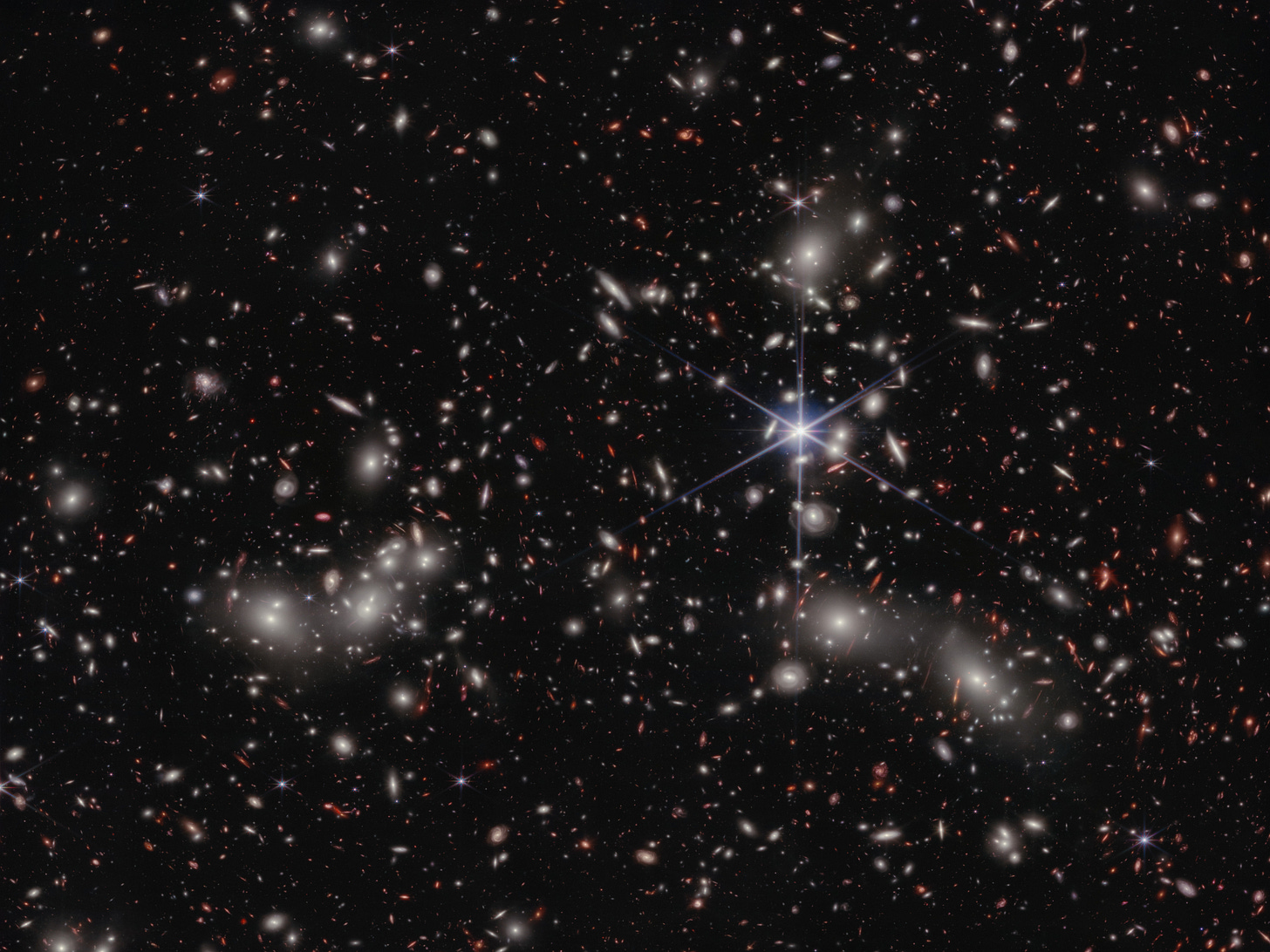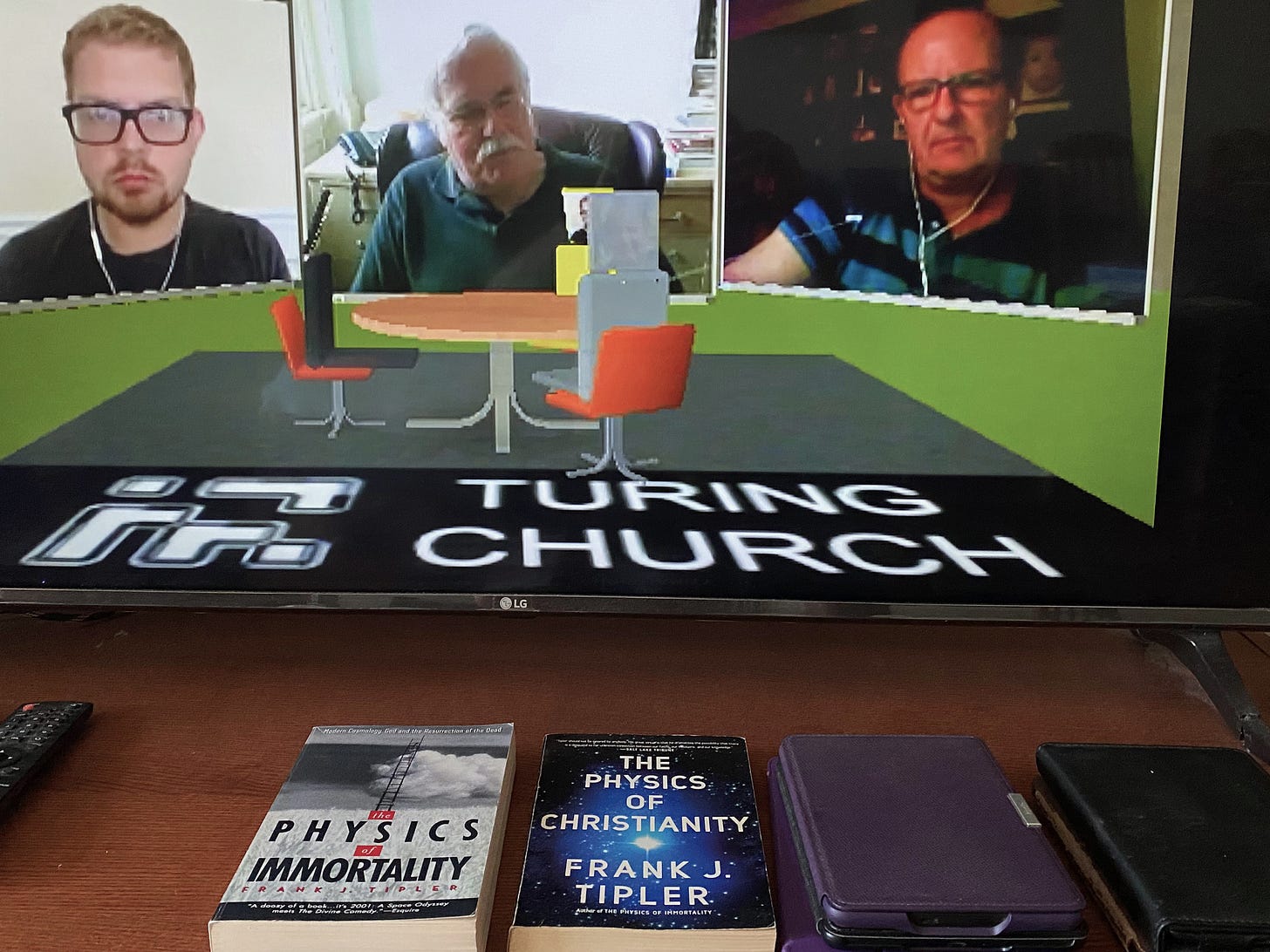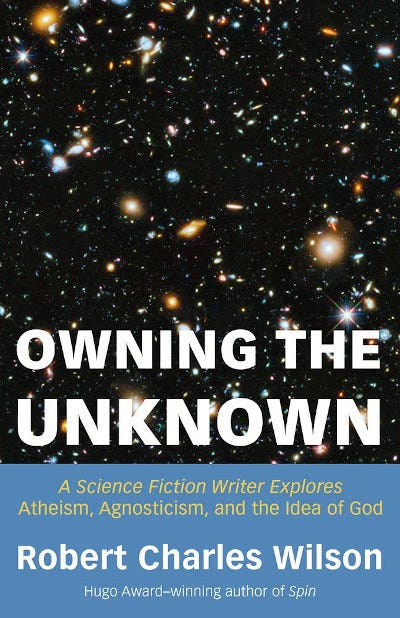Review: Owning the Unknown, by Robert Charles Wilson
Also, determinism and free will in Frank Tipler's Omega Point theory.
Greetings to all readers and subscribers, and special greetings to the paid subscribers!
Please scroll down for the main topic of this newsletter. But first:
In the process of drafting my new book, I’m reading again Frank Tipler’s “The Physics of Immortality” (1994). Frank’s book had a great influence on the development of my ideas, and every time I read it again I find something new to think about.
I’m also watching again the video of the conversation Micah Redding and I had with Frank in July 2016.
These are the questions I had prepared for the 2016 conversation. Watch the video to hear Frank’s answers.
Questions (books):
Most physicists loved your first book (The Anthropic Cosmological Principle), your second book (The Physics of Immortality) got mixed reviews, and most physicists hated your last book (The Physics of Christianity). Why?
What changed in your thinking between the first and second book, between the second and third book, and after the third book?
Are you writing another book? If so, can you say something about it? If not, are you thinking of a next book?
Questions (physics)
In which sense is Feynman’s quantum GR (as described in Lectures on Gravitation) a viable theory of quantum gravity? Others seem to consider it as valid only for weak fields, an “effective field theory” to be superseded by new theories.
In which sense is the Core Theory (SM plus quantum GR) a ToE? Again, others seem to consider it as valid only for weak fields, an “effective field theory” to be superseded by new theories.
What boundary conditions must be added to the Core Theory to make it consistent and usable?
You seem to think that we already have a final ToE. Don’t you think future developments could revolutionize current physics, just like GR and quantum mechanics revolutionized previous physics? You seem to think that the GR and quantum mechanics revolution wasn’t that big…
Could you try to explain as simply as possible what is the Wheeler-DeWitt equation and why it’s important? What does solving the Wheeler-DeWitt equation mean?
What is “dark energy”? How does it relate to Einstein’s cosmological constant? Can the measured cosmological constant be explained?
What should our descendants do to steer the universe toward a good outcome, and how?
Could super-advanced alien civilizations be doing that right now, and how could we detect their efforts?
Is there any alternative scheme that could work in an ever-expanding universe, for example as in Freeman Dyson’s article Time without end: Physics and biology in an open universe?
Do you still consider your “time travel machine” idea (Tipler cylinder) as valid, and could one be conceivably engineered?
What’s your best argument for Everett’s interpretation of quantum mechanics? Don’t you think “Many-Minds” is more accurate than “Many-Worlds” and closer to what Everett had in mind?
Questions (theology):
In The Physics of Immortality, intelligent life at the end of time plays the role of God. But in The Physics of Christianity you introduce a more traditional concept of God, outside (or at the edge of) space-time. What’s the relation between the two?
Is God a Deist God or the Theist personal and loving God that believers pray to?
Who engineered the resurrection of Jesus as described in The Physics of Christianity? Or did it happen “spontaneously”?
Could you comment on Pannenberg (Systematic Theology Vol. 2): “[The] divine reality, according to Tipler, does not come into being only at the omega but is to be thought of as free from all the restrictions of time at the omega. Therefore, in terms of the eschatological future, this divine reality is present at each phase of the cosmic process, and hence as already the creative origin of the universe at the beginning of its course.”
See also Frank’s talks at he 2011 Turing Church workshop and at the 2005 and 2022 Terasem Colloquia.
Frank’s Omega Point theory [Tipler 1994, 2007, Chapter 15 of Prisco 2020] is a highly speculative scientific theory that can be read as science fiction or as a new religion.
I hope Frank is not reading this, or he won’t talk to me again: he is persuaded that his Omega Point theory is not science fiction but solid, rigorous science. He could well be right and be proven right by future science. Time will tell. Meanwhile, I read his works as visionary, inspiring science fiction on steroids, scientifically plausible enough to suspend disbelief in the possibility that future science might have something hopeful to say about life after death.
By the way, in the story told by Jon Bialecki [Bialecki 2022], I’m the person who “remembers sitting bedside while his unconscious mother passes” with one book as companion, my favorite Frank Tipler’s book [Tipler 1994].
I won’t repeat the summary of Tipler’s theory with commentary that I wrote in [Chapter 15 of Prisco 2020], but let me say this again: If I have to choose between Tipler and his critics, I'll take Tipler anytime, at least he is intellectually engaging in an inspiring way.
And to the many bureaucrats of science who attacked and continue to attack him, I’d like to ask this: Are your own ideas celebrated in a poem by a winner of the Nobel Prize in Literature? Frank’s ideas are [Miłosz 1995]. Of course this doesn’t prove him right, but it does show that our collective mind is yearning for new scientific paths to transcendence.
Reading [Tipler 1994] again, I’m especially interested in what he said about determinism and free will.
Determinism seems to rule out free will. Some thinkers propose weak “compatibilist” versions of free will that can be accommodated in a universe that is fully deterministic in the sense of Laplace, but to me compatibilist free will is fake free will. Real free will is the “libertarian” free will of free agents that can choose and make a difference. Free will is real “only if our actual decisions are not determined by the rest of the universe, past, present, or future, but instead we ourselves are the ultimate and irreducible source of our decisions” [Tipler 1994].
I think the tension between determinism and free will disappears if we adopt a more general and flexible notion of global determinism (libertarian determinism): The history of a globally deterministic universe “is determined ‘all at once’ by external, atemporal laws of nature” (listen to my conversation with Emily Adlam). Each part of the history “is dependent on all other parts of the history.”
If what I do is determined by the whole universe but not uniquely determined by the past of the universe (or more generally, by the universe minus me), then yes, the universe determines what I do, but what I do determines the universe in turn, in a self-consistent loop.
This deterministic loop includes free will: I'm still determined by the whole universe but not by the universe minus me. Then I can think that I am an integral and irreducible part of the cosmic feedback loop, and this is a kind of free will - the universe without me wouldn’t be the same universe, and therefore I’m one of the agents that determine the universe.
Tipler made similar considerations in [Tipler 1994]. Our local laws of physics in the here and now, he said, must necessarily “have a little vagueness” and cannot determine all decisions of all agents. “The free decisions of the agents are an irreducible factor in the generation of the physical universe and its laws, not merely the reverse,” he said.”For the free decisions of all the agents past, present, and future collectively generate the totality of existence.”
Tipler argued that “the indeterminism in quantum gravity is ontological and logically irremovable: it ultimately comes from Gödel's Incompleteness Theorem” [Tipler 1994]. Tipler’s argument is based on his Omega Point theory [Chapter 15 of Prisco 2020] and a Gödel-like mathematical theorem which states that “the topological equivalence problem for 4-manifolds” can’t be solved by any algorithm [Penrose 1994].

I’ve been reading “Owning the Unknown: A Science Fiction Writer Explores Atheism, Agnosticism, and the Idea of God” (2023), by Robert Charles Wilson.
God knows I’m not a fan of atheist propaganda. But I decided to read this book and was impatiently waiting for it, because Wilson is one of my top five favorite science fiction writers. And having read the book, I see that it is not militant atheist propaganda. Actually, Wilson sounds more like a thoughtful agnostic to me, but he prefers to call himself an atheist.
My favorite Wilson’s novel is “Blind Lake.” But if you ask me which of his novels you should read, I recommend you read them all. He writes great stories of people like us in an astounding universe, and his stories engage both the brain and the heart.
“Owning the Unknown” is partly an autobiography, partly a commentary on science fiction, partly a collection of interesting stories and thoughts about science, but mostly a defense of agnosticism (sorry, atheism). However, you won’t find militant, intolerant attacks on believers: Wilson doesn’t tell you to stop believing in whatever you want to believe in. You’ll find calm, thoughtful, and friendly arguments against literal interpretations of specific religions, in particular Christianity.
I thought I would criticize “Owning the Unknown” from the perspective of one who prefers to call himself a believer, but there’s nothing in the book that I disagree with. The religion Wilson criticizes is not mine. Actually I agree with everything Wilson says. I guess my kind of belief has more in common with Wilson’s agnosticism than with traditional religion.
So since I can’t criticize Wilson for what he says in this book, I’ll criticize him for what he doesn’t say.
Religions have been invented to help us cope with “the human knowledge of death.” I agree. If I believed that I and those I love will irreversibly cease to exist after death, I would plunge into a despair so deep that I would jump off the closest window. So I’ll persuade myself that death is not the end, or die trying. This is, I think, why we want and need some kind of religion.
Wilson includes a conversation with an imaginary Christian believer called Chris, and gives good answers to the objections of Chris. At the end of the conversation, Wilson acknowledges that Chris deserves more answers, and then tries to provide more answers. I think Wilson’s answers fail to provide the consolation that we want and need. But he could have offered consolation without betraying the spirit of science.
One of the central points of Wilson is that “we’re surrounded on all sides by the unknown.” Another is that “the truth about ultimate reality, should we ever learn it,” will confound the expectations of all philosophies and religions. Another is that potential descriptions of metaphysical reality “occupy a vast possibility space.” So vast, in fact, that the probability that one specific description (e.g. the description given by one’s religion) is right is very small. I agree.
But in this vast possibility space there are potential descriptions of metaphysical reality, inspired by science, which include God-like entities and life after death. These descriptions can offer the consolation provided by religion. For example, the simulation hypothesis and Frank Tipler’s Omega Point theory are essentially equivalent to the cosmic aspects (not to be confused with the provincial aspects) of religion, and offer hope in life after death. I read both as Wilsonesque science fiction, grounded in speculative science but analogous to religion.
Wilson himself uses many of these descriptions in his science fiction novels (and this is why he is one of my top five favorite science fiction writers). I’m sure he’s perfectly aware that, putting together ideas that he uses in some of his best novels such as “The Harvest” and “Darwinia,” with some time travel or at least time scanning sprinkled here and there, one can build a concept of life after death granted by God-like but naturally evolved entities, which is consistent with the spirit of science.
Wilson could have said to Chris, look, I don’t think your religion is factually right. But I can offer you something better. I can offer you the idea that, perhaps, you and all the people you love or loved will live again and be together again, by grace of God-like natural entities in the universe (perhaps including our own descendants) and by means of scientific magic in the sense of Clarke’s third law.
I suspect Chris, who is described as a nice but fundamentalist Christian, wouldn’t be entirely happy with this answer. But to me this answer is good enough.
This cosmic part of religion is the only one that I need. I want to keep it, and I want to formulate it in a way that is consistent with the spirit of science. For what concerns other, provincial parts of traditional religions, full of lifestyle prescriptions and bigotry, I quite agree with Wilson.
In the process of writing this review I had an interesting conversation with Wilson, who said:
“Something I learned in the writing of this book is how interesting the subject of faith and religion becomes once we separate dogma from speculation - interesting not just philosophically but because it touches on so many profound aspects of human life, from the political to the aesthetic. It’s all worth exploring.
As for agnosticism vs. atheism, I suppose you could think of my metaphysical agnosticism as a kind of waveform that collapses into atheism on contact with any highly-specified form of theism.
In any case, I wanted Owning the Unknown to be a book that makes room for disagreement - I hope I succeeded at that.”
He succeeded indeed! This is a five stars book. Read it!
I hope Wilson will give me permission to steal his words and change one letter: I suppose you could think of my metaphysical agnosticism as a kind of waveform that collapses into theism on contact with any highly-specified form of atheism.




"I agree. If I believed that I and those I love will irreversibly cease to exist after death, I would plunge into a despair so deep that I would jump off the closest window."
COULDN'T HAVE SAID IT BETTER.
That is exactly how I feel
I agree with your article 99.9 percent. (because no person can agree with another person's article exactly 100percent)
Concerning Frank Tipler, I too was impressed with his book "The Physics Of Immortality" when it was first published back in 1994, but not so much now because he made a number of predictions and said that if even one of those predictions turned out to be wrong his entire theory could not work. And most of Tipler's predictions did turn out to be wrong, some spectacularly so.
Tipler predicted the expansion of the universe would slow down, stop, then change direction and collapse in on itself. From the heat of that imploding fireball he thought a hyper-advanced civilization could extract an infinite amount of energy and use that energy to perform an infinite number of calculations, not a very large number of them an infinite number of them. We now know that due to Dark Energy discovered in 1998 (which he did NOT predict) that the expansion of the cosmos is accelerating not decelerating, so that fireball will never happen.
And there were other errors. Tipler said the Higgs boson must be at 220GEV +- 20 , but we now know it is 125.3GEV +- .5 . And Tipler said the Hubble constant must be less than or equal to 45 but it's about 70. We don't live in the sort of universe that Tipler thought we did. More than one of his predictions was wrong so if we take Tipler at his word his theory must be wrong.
As for Tipler's 2007 Book "The Physics of Christianity" ... what can I say ....It's hard to believe it's not a parody joke book, but apparently it's not. He said we should look for DNA on the Shroud of Turin (that for some unstated reason he is certain is not a fake ) because we should be able to distinguish between divine DNA and regular DNA because Original Sin is a gene and obviously Jesus had no Original Sin in his DNA. Tipler said that Jesus managed to walk on water by "directing a neutrino beam downward from his feet" and that's also how the Virgin Mary ascended into the clouds when she died, so he recommends we check for radiation around the tomb of the Blessed Virgin Mary that would have been caused by that intense beam of neutrinos that shot out of the bottom of her feet. I'm not joking, Tipler said all that, and sadly I don't think Tipler was joking either.
I don't believe any of these "scientific" arguments convince Tipler that Christianity is true, instead he believes that Christianity is true because his mommy and daddy told him it was true from the moment he learned how to talk, it's the same reason almost everybody belongs to the same religious franchise that their parents did. In that regard, although everybody gets older, most don't mature.
John K Clark